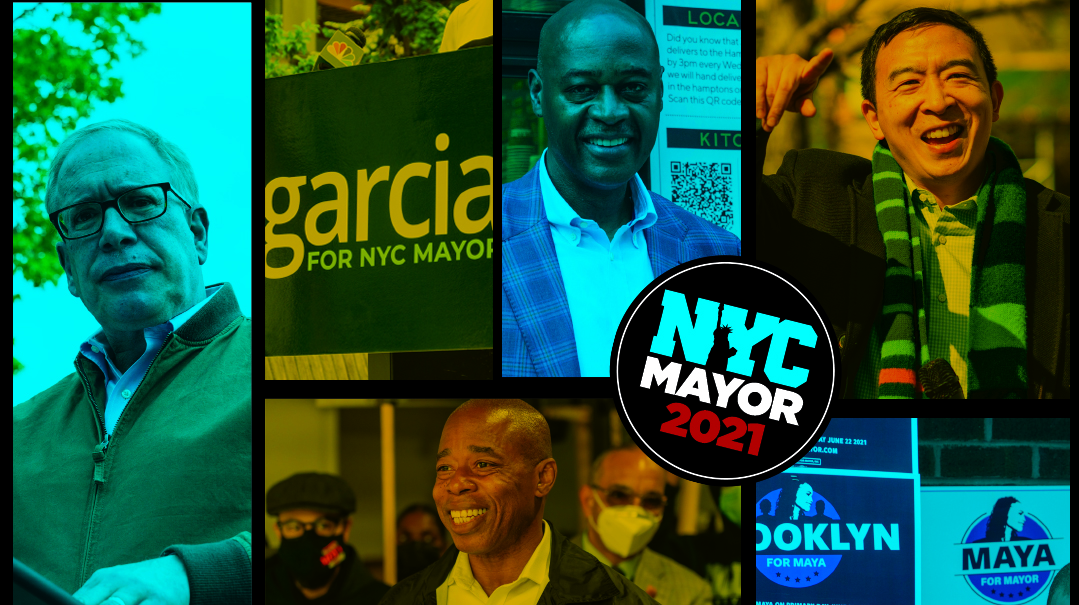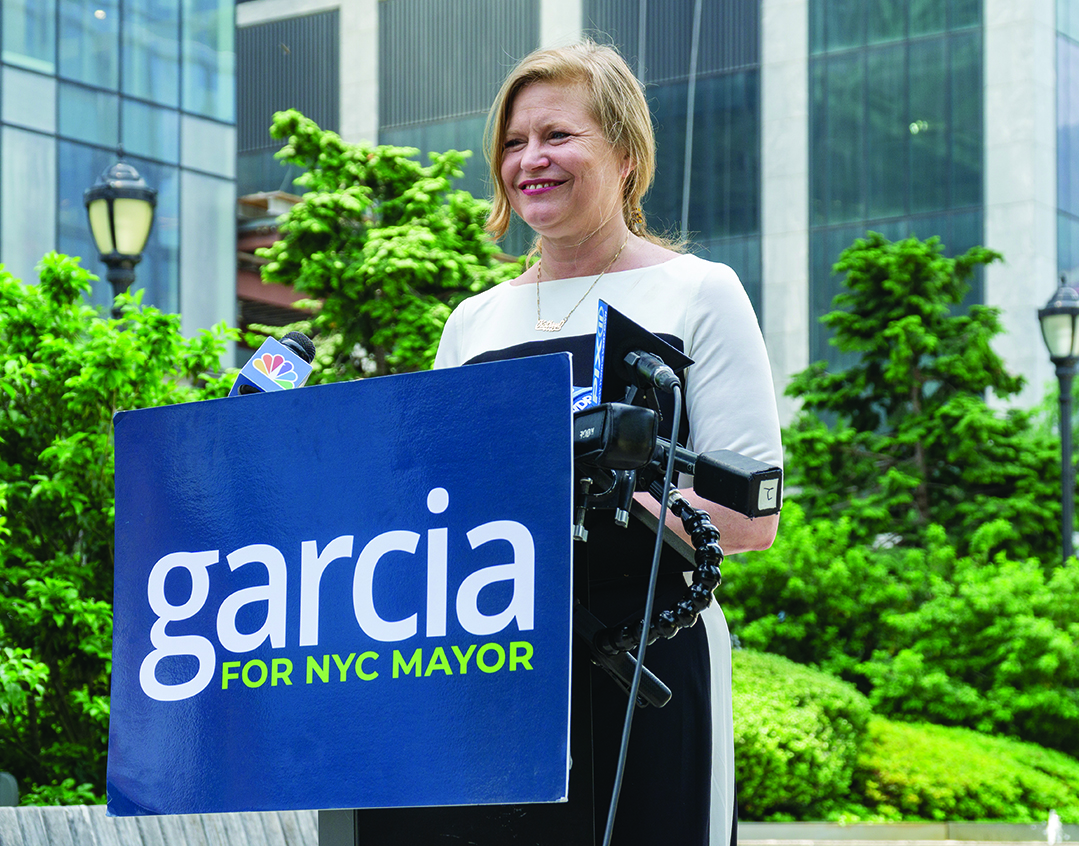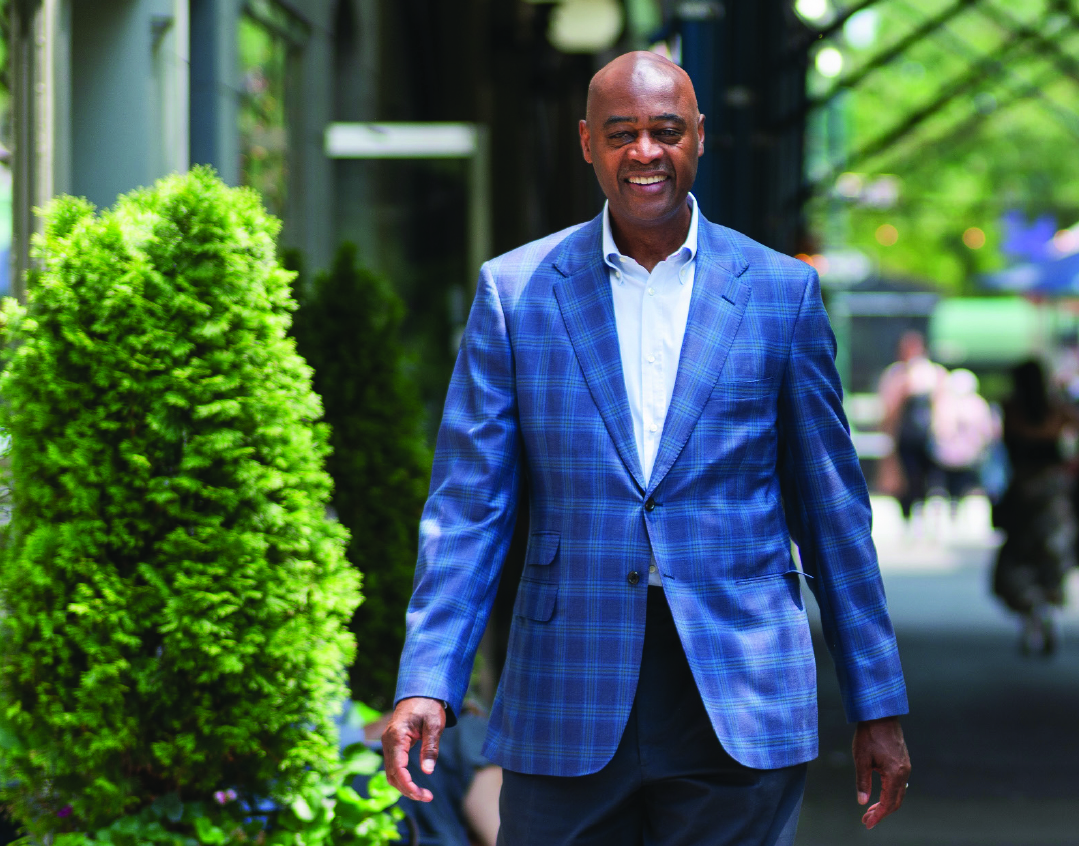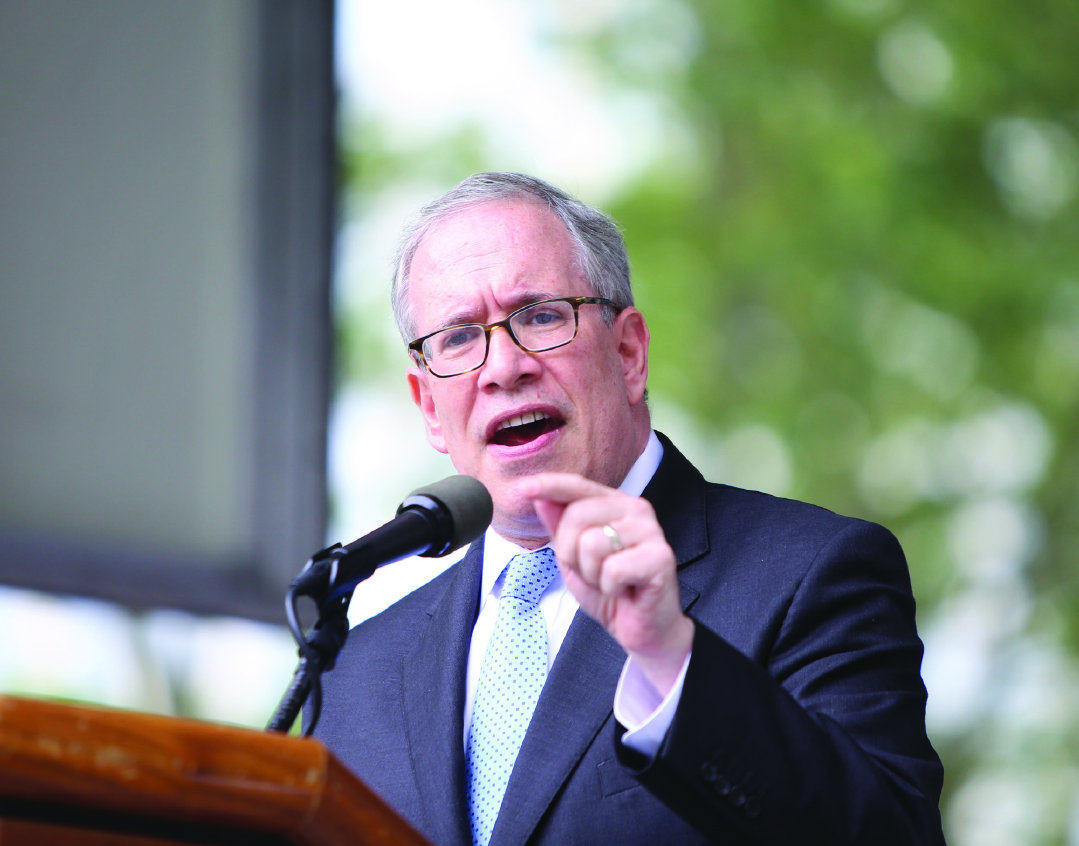Big Choice in the Big Apple

New York’s 110th mayor will emerge next week

The winner of next Tuesday’s Democratic primary is virtually guaranteed to be New York’s 110th mayor, given the party’s overwhelming strength in the city. A much lower-key Republican contest featuring three candidates will also take place on that day. The new and untested addition of ranked choice voting will inject confusion into the process.
On the Democratic side, the field began with a record three dozen men and women who looked in the mirror and saw a mayor. That quickly whittled down to about eight, with two primaries playing out side by side in one party. On the progressive end, Scott Stringer, Maya Wiley, Diana Morales, and Shawn Donavan are fighting for the right to carry the red banner forth, while on the more moderate flank, Andrew Yang, Eric Adams, Ray McGuire, and Kathryn Garcia are duking it out.
Yeshivos, Yeshivos, Yeshivos
For the Orthodox community, the election comes at a time of record anti-Jewish violence, after 18 months of officials blaming everything from Covid to vaccination rates on Jews. Governor Andrew Cuomo called the pandemic an “ultra-Orthodox Jewish problem” and red-zoned frum neighborhoods, while Mayor Bill de Blasio sent his infamous “My message to the Jewish community, and all communities” tweet. Unlike Cuomo, de Blasio has apologized several times.
But the overarching issue in the campaign, the first, second, and third issues for the Orthodox community, is the state’s attempt to tamper with the yeshivah system. Sender Rapaport, the director of the soup kitchen Masbia who has organized several voter registration drives, says this is what animates voters.
“The kitchen table issue is yeshivos,” Rapaport said. “It’s not like something else is issue number two. Everything else is issue number 25. The first 24 issues are yeshivos, yeshivos, yeshivos. This is all people are talking about.”
While the state’s Board of Regents holds the decision-making power, enforcement will be up to the city’s education department, which is under the mayor’s purview. The Board of Regents has indicated it will soon release regulations that will force yeshivos to teach secular studies on par with public schools.
Orthodox Bloc Vote?
The Orthodox community —located principally in Boro Park, Williamsburg, Flatbush, Crown Heights, and parts of Queens and Staten Island —usually brings out about 15 percent of the citywide vote, with high turnout boosting it up to 20 percent. Many yeshivos sent home letters asserting that Boro Park alone has 50,000 eligible voters, but only 14 percent of them turned out in the last election.
The community’s endorsement chest is divided between the only two candidates who have relentlessly pursued its votes, Yang and Adams.
Here is a brief rundown on the candidates, as well as where they stand on issues of interest.
Eric Adams
Police Champ, Police Critic

Brooklyn’s borough president for the past eight years, Adams is a former cop and state senator representing Crown Heights and Bedford-Stuyvesant. Polls consistently show him in either first or second place, and he is considered to have the best chance of winning once all the ranked choice votes are tabulated. Quite impressive, considering that this is his first competitive election — he ran unopposed in both his borough president races, and won over 80 percent of the vote in all three of his state senate campaigns.
The Adams Base
To win under ranked choice, you need a base of voters, and you need to be acceptable to enough others to be one of their ranked choices. Adams started out with hopes of converting Brooklyn’s communities —Jews, Muslims, and blacks — into his base. That didn’t work out, with Al Sharpton declaring he was staying out of the race for the first time since 1989 and Yang taking the lion’s share of Jewish endorsements.
Jews and blacks, it turns out, want security, not social justice. Adams has since transformed his campaign into “a vote for Adams is a vote for security.” He dropped all references to cuffing police or the racism he claims to have experienced in the NYPD, instead promising to increase patrols and beef up the fight against hate crimes.
Farrakhan vs. Giuliani
Adams has been a moderate Democrat since entering electoral politics two decades ago. But what happened before that is still a head-scratcher.
For example, in 1993, just two years after the Crown Heights riots that scarred the Jewish community for a generation, Adams rallied with Al Sharpton and expressed support for Jew-hater Louis Farrakhan, saying he was filling a void left open by politicians. He since explained his comments as focusing on Farrakhan’s concern for crime among black youths.
By 1997, Adams was a bona fide Republican, supporting Mayor Rudy Giuliani. Adams said he did that in protest of Democrats failing the black community, “and if you take a close look at some of the concepts of the Republican Party, you’ll see that many of them are our values.” He remained in the Grand Old Party until the end of Giuliani’s term in 2001.
Adams’ Three-Part Turnaround on Yeshivos
To the Forward, in February: Said he would work with the community, but would “clearly communicate expectations and baseline standards according to state education law, as well as enforce compliance where necessary.”
To Hamodia, a week later: “If the city fails to follow the state... the state says to the city, ‘We’re taking your funding away; you’re not following our rules.’ So... [enforcement is] not within my control. I wish it was in my control, because I’m open to thinking differently about how we use methods to educate children, because that’s what I believe in.”
To Mishpacha, in May: “The [Hamodia] interview — it was a setup... Listen, I am not interfering with the way of life of the Jewish People. So when I’m hearing someone come to me and basically say, ‘Well, someone broke the law, what are you going to do?’ — how would you respond to that?”
Money Quote
“I am not getting in the way of your way of life — I cannot emphasize that enough. Your way of life is cost effective for our city — you don’t overburden my educational system, I don’t have a crime problem in your communities, your economic development is amazing — I am not getting in the way of your way of life, and that includes the circumcision.”
Who Is Eric Adams?
Is Eric Adams the black supremacist who supported Farrakhan and palled around with Sharpton of the 1990s? Or is he the backslapping Brooklyn beep who doles out chicken and rice at Masbia, appears at Pesach distributions, and dons a yarmulke for a late-night visit to the kever of the Ribnitzer Rebbe?
Is Eric Adams the police captain for two decades who gained a reputation for his harsh criticism of the department? Or is he Mr. Security who boasts of previous endorsements by the police unions?
Is Eric Adams the go-along-get-along who would accept everyone’s endorsement, “even the governor’s” and the mayor’s, or is he the one who stood a week later and denounced a rival’s “hypocrisy” for saying he would accept de Blasio’s nod?
Eric Adams is a nice guy with a reputation of saying the right things to everyone. To the Orthodox community, as well, he has been saying the right things. His initial equivocation on yeshivos led to a mass exodus of Jewish voters into the arms of the waiting Yang, but Adams has worked hard to bring some of them back. He abandoned his early anti-cop rhetoric, and ominously suggested that a community that dumps its old friends for the “shiny new toy” will suffer the consequences.
And it paid off. He has scored some major endorsements, including the Flatbush Jewish Community Coalition, which is known to have real influence on neighborhood voting patterns.
Andrew Yang
The Trumpy Outsider

Of all the candidates, Andrew Yang seems to most enjoy running for mayor. He doesn’t tweet about “covfefe” or call his opponents “low energy,” but his happy campaign has been compared to that of Donald Trump. Just don’t tell him that.
A 46-year-old entrepreneur, Yang was born to Taiwanese immigrants and made his money starting companies and then selling them. He gained celebrity status from his better-than-expected performance in the 2020 Democratic presidential primary, when legions of voters became “Yang Gang” tweeters over his promise for a “universal basic income” of $1,000 a month and a sort of post-partisan personality. He dropped out and reappeared as the front-runner in the campaign for City Hall.
His entry shook up the race, and he has led in all polls until the last few weeks. Adams and Scott Stringer have been campaigning for years, but Yang’s outsider status made him appealing.
The Yang Base
Yang, the only Asian-American in the race, started out with an aggressive push to gain his community’s support, as well as that of the Orthodox community. He hired David Schwartz, who produced an impressive array of endorsements that established Yang as the early favorite. This was cemented when Yang issued a firm, unqualified statement in February that yeshivos should not be forced to change their schedule or format.
While Yang has lost ground to Adams, he is still the first choice of most frum organizations who made endorsements. But he is the bane of the progressive left, which hoped to build on its success in 2018, when it flipped the state senate and elected a congressman, Jamaal Bowman, on Long Island. Mayor de Blasio has acknowledged holding a secret meeting with union leaders in the winter to strategize how to stop Yang’s ascendancy.
Yang on Yeshivos
To the Forward, in February: “As mayor, I will always respect religious freedom, including the freedom of parents to do what’s best for their kids educationally. Thus, we shouldn’t interfere with their religious and parental choice as long as the outcomes are good. There has been a complete lack of trust recently between the ultra-Orthodox community and city and state government. We need to revamp this relationship and acknowledge that educators at yeshivos and city education officials are all working towards the same goal — to ensure NYC students receive high-quality education.”
To Mishpacha, in March: “My first question when I was being made aware of this back-and-forth was, what does the data say about the educational outcomes of children coming out of yeshivos? The data suggests that children are thriving. And even yesterday, when I was in Kew Gardens, I saw a group of perhaps 50 high school students, girls, and I asked them how they liked their high school. They were so quick and so unanimous in saying that they liked it or loved it that I was frankly blown away. Because if you went to the average high school in New York state or in America and posed that question, you would not get that response. So my attitude is one of deference and gratitude to people doing the work to educate their children every day, and I think that any changes should be made with that in mind.”
Yang’s Two-Part Turnaround on Milah
On Twitter, in March 2019, during his presidential run:
“Do you have an opinion on routine infant circumcision?”
Yang: “Negative on it.”
“Just to be clear, is that a negative as in you’re against the practice (which I’m assuming), or negative as in you have no opinion?”
Yang: “Against the practice.”
To the Forward, in January: “And of course, as mayor, I’ll respect religious freedom. It’s a central reason why so many immigrated to this country in the first place. I will not get in the way of anyone’s right to circumcise their children and maintain the traditions of their faith. I have and always will attend friends’ brissim to celebrate this important religious milestone in the life of their new children.”
Money Quote
To Mishpacha, in March: “Even if there are a number of people upset at me at any given moment, which there probably will be, given the size and diversity of the city, as long as I make decisions that I can stand by that benefit the people of the city, I’ll be proud of what I’ve done.”
Who Is Andrew Yang?
Surprisingly, it took the political outsider to recognize that the Orthodox community sees through a candidate’s condemnations of anti-Semitism or promises to visit Israel if his commitment to yeshivos is not ironclad. Yang saw this early on, and his promise to leave yeshivos alone if elected spread like wildfire on frum chats and WhatsApp groups.
Yang has his quirks, to be sure. But on the core issues the frum community is concerned about — yeshivos, traditional bris milah, no support for BDS, and a strong hand against anti-Semitic violence — he has been saying all the right things.
Kathryn Garcia
Cleaning Up Messes

Kathryn Garcia is not promising any bold ideas, but she knows how to clean up messes. The former sanitation commissioner, 51, gained a reputation as a “steady as she goes” manager who gets the job done. Born in Manhattan, Garcia worked for de Blasio for six years, taking on the added portfolio as “food czar” when Covid set in.
Garcia was firmly ensconced in the third tier of candidates when a New York Times endorsement, followed up by the Daily News, led voters to give her another look. Since then, she has even led in one poll, though she told the Wall Street Journal that her path to victory is getting enough second place votes instead of aiming for the gold.
The other candidates were graceful to her when she was languishing in the polls — several said they would vote for her for second place, and Yang and Adams even said they would consider appointing her as deputy mayor. (She called that “compliment” offensive to women, telling the New Yorker, “Are you not strong enough to actually do this job, without me helping you?”)
That affection wore off when she started getting attention from voters. Now, Yang slams her for the “piles of trash” that littered the city during her tenure.
Garcia on Yeshivos
To Hamodia, in January: “I’m not seeking to extend my jurisdiction beyond the public school. [But if the state mandated changes,] we would have to follow the law.”
To the Forward, in February: “We need to be vigilant about bias and assumptions about religious education. [If elected, she would order the education department to ensure] all schools have access to every resource and educational service possible.”
Money Quote
“When [voters] looked around, it became very clear that it was my résumé and ability to get things done, coupled with a real vision of where to take the city, that resonated. It’s just the right time that they are discovering that.”
Who Is Kathryn Garcia?
One of Boro Park’s biggest headaches has been traffic, particularly since a decade-old law allowed yeshivos to purchase bus fleets. As sanitation commissioner, Garcia worked closely with the community to solve the traffic problem, even coming to the Brooklyn neighborhood one morning in 2016 to witness it herself. She then shifted garbage pickup to nighttime hours.
That showed a willingness to work with the community, she says. While she has not met with frum publications since becoming a front-runner — apparently seeking the progressive vote that eluded her as a moderate — she has deep connections that will serve the community well if elected.
Ray McGuire
The Business Candidate

Ray McGuire may not be a household name in New York, but the edge he holds over the other candidates is paved with green, lots of it. At a time when the city’s business class worries about the post-pandemic reopening, he is the only one vying for the Democratic nomination to offer a vision without raising taxes. At a time when the feared Democratic left is ascendant, he swears off defunding the police.
McGuire, 63, stepped down from his position as vice chairman at banking giant Citigroup to run for mayor. He has raised millions of dollars, eschewing the city’s generous matching funds program that gives $8 for every dollar in small donations raised. This speaks to the apprehension of his backers, who worry that the next mayor will make it harder for them to operate.
McGuire on Safety
To Mishpacha, in April: “We need to make our streets safe. They’re not safe now... And we obviously need to return respect and accountability and proportionality between the community and the NYPD. But we have to get the streets safe. I will stand very clear — it won’t take me weeks [to fight anti-Semitic violence].”
McGuire on Yeshivos
To Mishpacha: “We have to find a way to protect religious liberty and ensure all New Yorkers’ needs are met. Education of people of all faiths is key to developing our economy and keeping New York a leader in the future. I believe there is a way to work together with the elected and appointed leadership and the community in a partnership to do both of these things. There are 275-odd yeshivos, and we need to make certain that they are included when we are thinking about the education of our children.”
Money Quote
To Mishpacha: “Given the support of the Biden administration — especially Vice President Kamala Harris, whom I introduced to New York City — and infrastructure being among the highest priorities that they have outlined, we do not need to raise taxes. I want to keep businesses and high-paying taxpayers in New York City. We need them.”
Who Is Ray McGuire?
McGuire stands six feet, four inches tall, which would tie him with John Lindsay as New York’s second-tallest mayor, if he were elected. It would also ensure, at least, that mercurial governor Andrew Cuomo — with whom McGuire claims a working relationship — would look up to him.
McGuire is the only candidate from the business community. He is one of just three to hire an Orthodox liaison, and he has made it to number three on many endorsement lists of frum groups.
Scott Stringer
Everything for Everyone

Scott Stringer, 61, got to where he is by dogged determination and by being in the right place at the right time. A former state assemblyman, he left in 2005 after 13 years to become Manhattan borough president. He was running a low-key campaign for city comptroller when he got lucky and the former disgraced governor, Elliot Spitzer, jumped into the race. The establishment engineered a come-from-behind victory for Stringer.
No such luck this time. He’s running for mayor with virtually no base, having lost progressives to a string of accusations and the Orthodox community over his socialist endorsements and the soft line he took on yeshivos.
Stringer on Yeshivos
In a statement: “All our students should get a quality education that prepares them for the future... I will work with educators to ensure that’s happening in all schools — public and private, secular and religious.”
To Hamodia, on why he endorsed socialists: “Not everyone’s going to agree on all my endorsements. I’ve made 30 years’ worth of endorsements. Some you like, some you don’t. But what you should always know is when I make them, I stick with them. And that’s what I’m sticking to.”
Who Is Scott Stringer?
Scott Stringer’s map to City Hall has been simple. For years, he would attend every event in the Jewish, Pakistani, black, Puerto Rican, Italian — did I miss anyone? — communities, meeting media execs and doing everything to become the favorite.
In recent years, he threw his lot in with the socialists, becoming an early endorser of such candidates as Tiffany Caban, who wanted to basically end most prosecutions at the Queens district attorney’s office.
That appeared to be working. He received many endorsements for his mayoral candidacy, including from the young female socialists he helped elect, and began to rise in the polls. That all came crashing down when accusers came forward with allegations of abuse.
But cozying up to socialists cost him support in moderate communities, including the Orthodox. Not one frum group has endorsed him, even for a lower slot on the ranked choice system.
Maya Wiley
The Leftist Candidate
Leftists thought they had a wide field to choose from this election. Instead, they barely have one. Stringer imploded, Diana Morales was so leftist that her campaign staff unionized and went on strike, and Shawn Donavan hemorrhaged support after his dad plowed millions of dollars into a super PAC on his behalf, a huge no-no in progressive circles.
That leaves Maya Wiley, former counsel for de Blasio who bitterly turned on him. Progressives have coalesced around her candidacy in recent days.
Wiley, 57, is so liberal on so many issues that she hasn’t even bothered with the Orthodox vote. She wants to slash the police budget in half, from $6 billion to $3 billion, and would make investigating yeshivos a priority.
The good news is that she has very little chance of winning.
(Originally featured in Mishpacha, Issue 865)
Oops! We could not locate your form.













